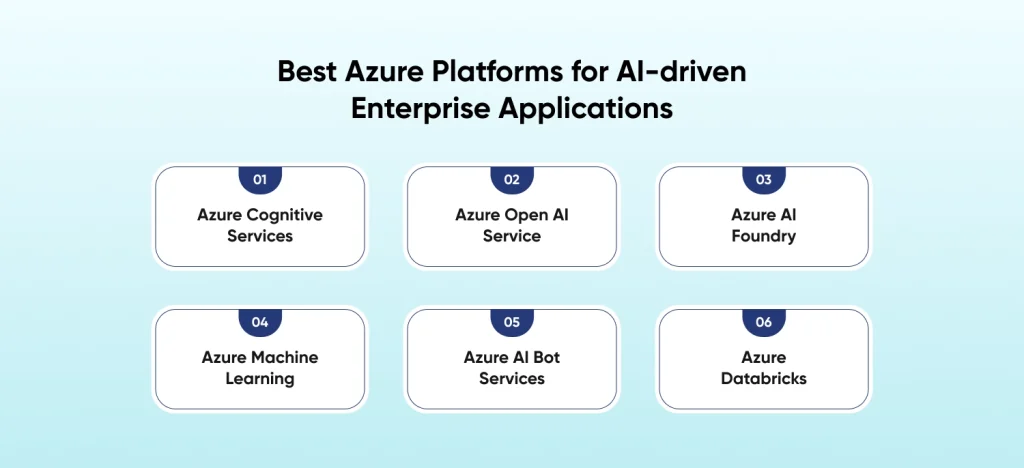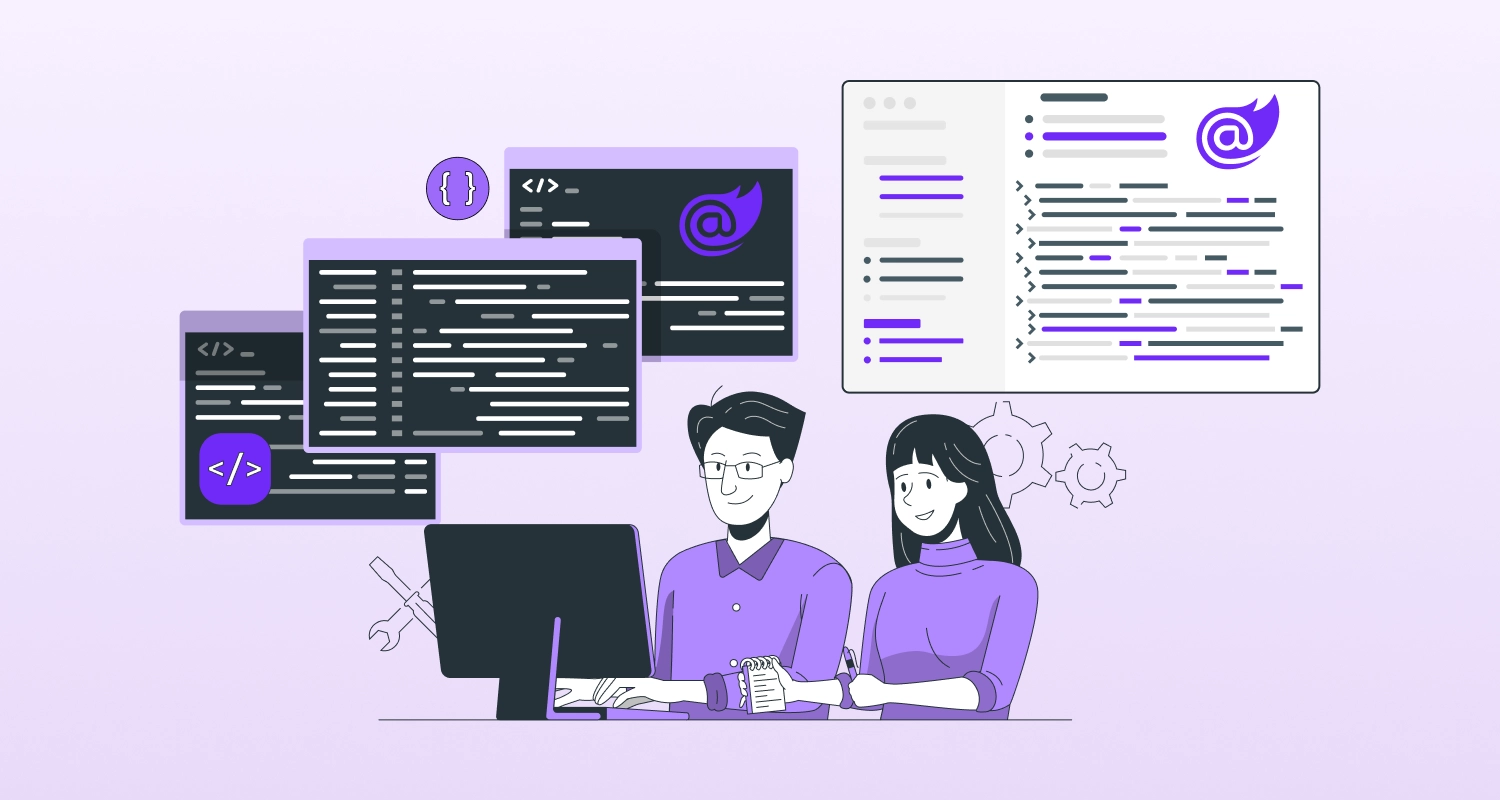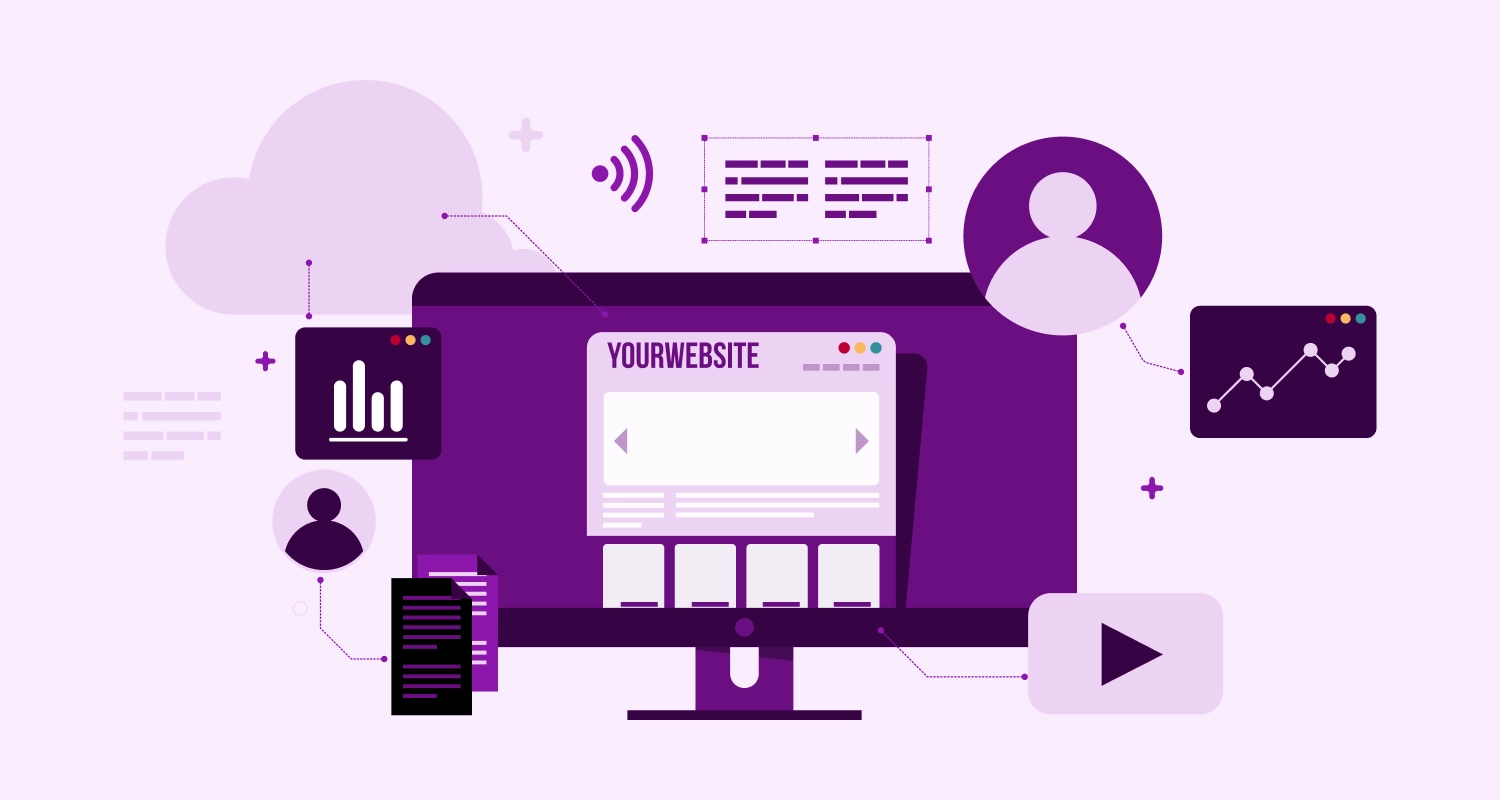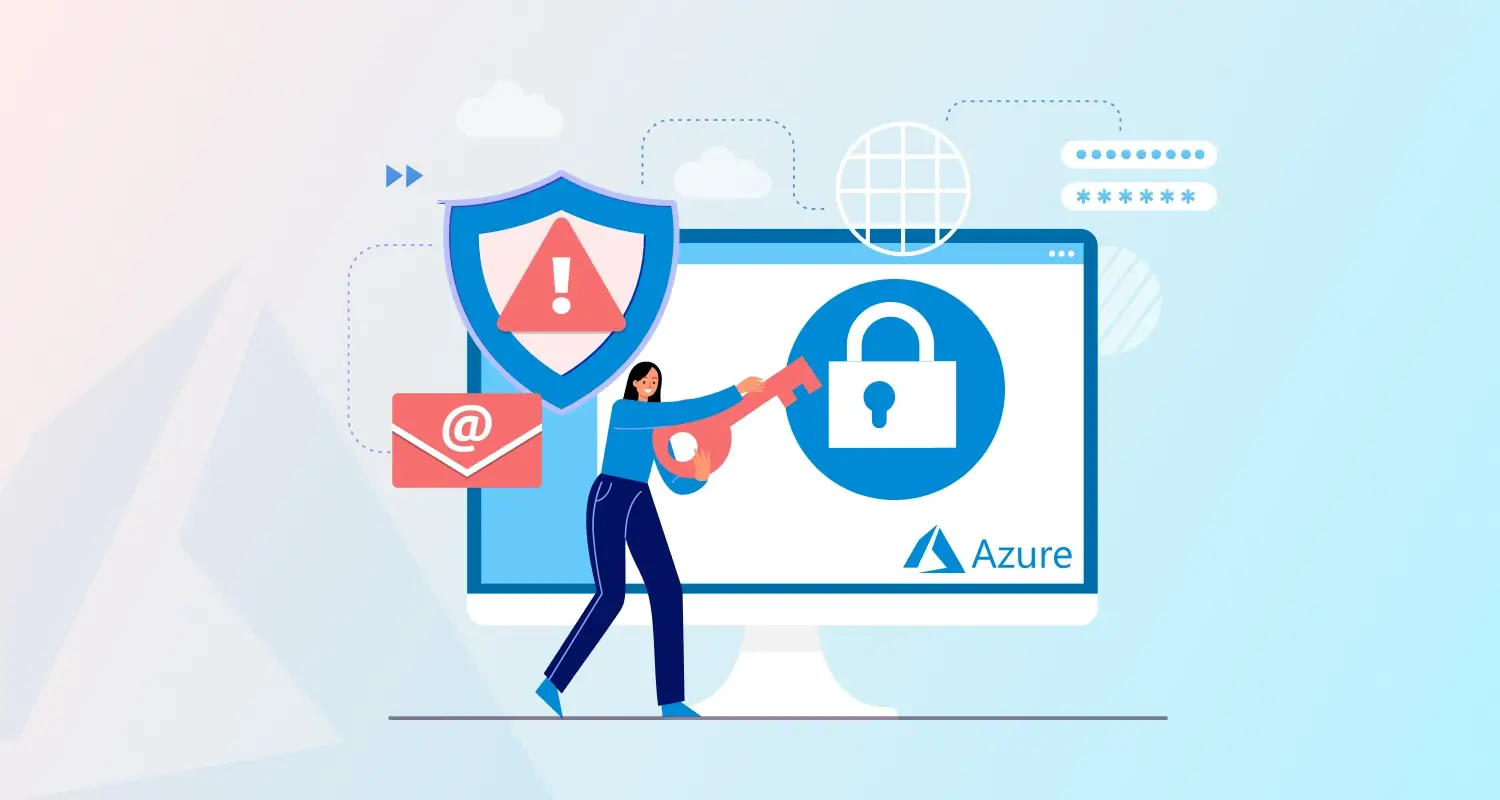For all businesses looking to keep up and thrive in this digital landscape, they are turning to AI to gain competitive advantage, streamline their business operations and deliver personalized user experiences. Microsoft Azure is a great platform for developing AI-driven enterprise applications.
It comes with an extensive suite of cloud-based tools, frameworks and services, designed for intelligent app development. This blog will tap into the Microsoft Azure Ecosystem and its ability to build enterprise apps infused with AI.
Why Create Enterprise Applications with Azure AI?
Azure comes with many in-built and optimized features and capabilities, making it an ideal choice for custom AI software development services. Here are the top reasons to get enterprise AI solutions on Azure:
Comprehensive AI and Machine Learning Toolset
Microsoft Azure has a dedicated ecosystem of AI tools for streamlining business workflows and building smart web applications. With tools like Azure Cognitive Services, Azure Bot Services in enterprise apps and Azure Machine Learning, businesses can get a one-stop-solution for all their AI requirements without having to rely on multiple vendors.
Scalable and Secure Infrastructure
Azure is a Microsoft product, and hence it is built with security and scalability in mind. Building enterprise-grade apps with Azure AI results in high-availability systems and global reach, making sure the app works consistently even when under immense workload. With professional enterprise app development services, clients can rest assured their AI-driven enterprise apps would be both – secure and scalable.
Seamless Integration with Microsoft Ecosystem
Microsoft builds all tools with an ecosystem mentality, and Azure is no exception to this. Many companies connect it with Microsoft 365, Dynamics 365 and Power BI tools.
Responsible and Ethical AI Framework
Microsoft is known for responsible AI practices and it also offers built-in tools for bias detection, model interpretability and compliance auditing to help organizations keep their applications compliant and transparent.
Best Azure Platforms for AI-driven Enterprise Applications

Wondering how to use AI in Azure, or the different use cases where you can integrate AI in enterprise applications using Azure? Let’s have a quick look at the different available Azure platforms and tools we can use to create enterprise applications using Azure AI. Make sure to follow enterprise application integration best practices for the most seamless integration.
- Azure Cognitive Services
Azure Cognitive Services has many pre-built AI capabilities that allow developers to integrate speech, vision, language and decision-making intelligence into enterprise applications without needing to build those models from scratch. This saves considerable time and resources as such models need to be trained on tons of data over a period of time to be reliable.
It is ideal for companies that want to create enterprise applications with Azure AI on an urgent basis.
- Azure Open AI Service
Azure Open AI service allows developers to build bespoke gen AI solutions for their clients. It uses various AI models such as DALL-E, GPT-4 and others for delivering bespoke AI-powered experiences.
It can be used for companies looking for content generation solutions, data-driven insights, workflow automation, accessibility and more. It is generally implemented in intelligent contact centers for modernizing customer support, summarizing conversations and reducing post-call efforts.
- Azure AI Foundry
Azure AI Foundry is a dedicated Microsoft tool used for simplifying development processes and improving AI efficiency.
This enables developers to build their own intelligent enterprise-grade agents for automating complex business processes. It can also be used for smart document analysis and summarization, delivering personalized recommendations, fraud detection and much more.
- Azure Machine Learning
Use Azure ML for businesses that need business-critical ML models at scale, with faster time to market and streamlined operations.
From data preparation to building purpose-built AI infrastructure, and from fully automated machine learning capabilities to ensuring responsible AI, this platform provides complete Azure AI Services for machine learning.
- Azure AI Bot Services
One of the most popular AI Azure tools that is generally added in the Microsoft Azure enterprise app development services includes Azure AI bot development services. Azure provides the right environment, infrastructure, and tools for designing and building enterprise-grade conversational AI bots.
Azure smart bot development provides a low-code graphical interface that speeds up Bot development timelines and creates multimodal and multichannel experiences with minimal code changes. All chatbots built using Azure AI bot services maintain compliance and governance to relevant regulations.
- Azure Databricks
Build a serverless web app in Azure using Azure Databricks.This Azure product provides data and AI service that allows enterprises to store their data on a simple open lakehouse and centralize their analytics and AI tasks.
It works with other AI services like Azure Data Lake Storage, Data Factory, and Power BI. It provides a simple, open and collaborative platform that can handle millions of server hours per day and is optimized for Microsoft ecosystem.
Azure AI Capabilities and Use Cases

Building AI-Driven Enterprise apps using Microsoft Azure provides a comprehensive range of AI services that empower businesses to build intelligent, scalable, and secure custom software solutions. Here are the key service categories driving innovation across industries:
ML Model Development
Azure Machine Learning helps build, train and deploy custom machine learning models. Businesses use it for predicting outcomes, automating decisions, and solving data-driven challenges like fraud detection in the finance industry or forecasting in retail.
Image Processing
When building AI-Driven enterprise apps using Microsoft Azure Computer Vision, businesses can analyze images and extract useful information. This tool is widely used for healthcare diagnostic requirements, inventory tracking in retail, and quality checks for manufacturing.
User Communication
Use Microsoft development services like Azure Bot services and Communication services that help companies build AI-powered chat and voice interfaces. Such AI tools support virtual agents, customer interactions and internal business communication apps using built-in AI intelligence.
Anomaly Detection
Use Anatomy Detector to detect unusual patterns in data. It’s commonly used in industries like finance, logistics and others to monitor operations, detect risks early, and prevent costly system failures.
Speech and Language
When you hire AI developers from a reliable web and mobile development company, you get to integrate various text-to-speech and speech-to-text solutions in your applications. This can be used for various purposes in fintech, education, healthcare and other such industries. Azure has dedicated services like Azure Function, Azure Speech and Azure Cognitive that can help you build accessible and speech-enabled smart applications.
Steps for Building AI-Driven Enterprise Apps Using Microsoft Azure
Step 1: Set Up an Azure Account
To begin, ensure you have an active Azure subscription.
- Visit the Azure Portal.
- If you don’t have an account, sign up and choose a subscription plan.
- Verify billing and set up identity access management for secure operations.
Step 2: Create an Azure OpenAI Resource
You’ll need to create and configure a new resource in Azure to access OpenAI services.
- Start by navigating to Create a Resource and search for “Azure OpenAI”.
- Click the Azure OpenAI service and click Create.
- Choose your subscription, resource group, and provide a name for the instance.
- Select a region that supports Azure OpenAI (e.g., East US).
- Review and create the resource.
Step 3: Apply for Access (If Required)
Azure OpenAI might require approval before usage.
- Fill out the request form from Microsoft if prompted.
- Provide use case details — Microsoft often reviews applications to ensure ethical usage.
- Once approved, access to models like GPT-4 and Codex will be enabled in your portal.
Step 4: Deploy a Model
Once the resource is set up, you must deploy a specific OpenAI model.
- Open your Azure OpenAI resource.
- Click on “Model Deployments” or “Deployments” from the side menu.
- Choose a model (e.g., GPT-4, GPT-3.5, or Embedding models) and set a deployment name.
- This deployment name will be used later as a reference in API calls.
Step 5: Obtain Endpoint and Keys
Add credentials and connect with Azure OpenAI.
- Get Keys and Endpoints in your Azure OpenAI resource.
- Note the Endpoint URL and API keys provided there.
- Use these credentials to authenticate requests from your application.

Step 6: Connect Azure OpenAI to Your Application
Here’s what’s needed at a high level to make the connection:
- HTTP Client Setup: Use any HTTP client tool (like Fetch, Axios, Postman, or native libraries) to send requests.
- Headers: Include your API key for authorization.
- Request Payload: Send the input prompt and desired parameters (like max tokens, temperature, etc.) in JSON format.
- Endpoint Structure: Use the endpoint URL combined with the deployment name to target the correct model.
Step 7: Handle Responses and Implement Logic
- Parse the response from Azure OpenAI (typically in JSON format).
- Get model’s output from the response body.
- Integrate the output into your application — whether it’s a chatbot, content generator, summarizer, or other AI function.
Step 8: Monitor Usage and Fine-tune as Needed
Azure provides monitoring tools to track and optimize your usage.
- Go to the Metrics and Usage tabs in your resource to view consumption.
- Adjust parameters like temperature or prompt format to improve results.
- Optionally, consider fine-tuning models for domain-specific tasks if available.
Step 9: Secure and Scale Your Integration
Ensure your application scales and stays secure.
- Use environment variables to store API keys.
- Add rate-limiting to handle traffic efficiently.
- Use Azure’s role-based access control to manage access controls and modify the OpenAI resource.
Step 10: Stay Updated with Azure Documentation
Azure OpenAI evolves quickly. Hence it is important to:
- Keep an eye on the official Azure OpenAI documentation for the latest models, rate limits, and pricing.
- Review ethical usage policies regularly to ensure compliance.
How Azure AI Solutions are Used In Different Industries?
As we saw, Azure has many AI services, tools and solutions at its disposal. It can be used for carrying out basic automation tasks and even use-case specific complex AI and database operations, depending on the project need. Here is how different industries enable intelligent automation with Azure or use Azure machine learning for business.
| Industry | Use Cases | Azure Tools & Services | Key Benefits |
| Healthcare |
|
|
|
| Education |
|
|
|
| Transportation |
|
|
|
| Telecommunications |
|
|
|
| Manufacturing |
|
|
|
Azure AI in Healthcare
According to a program page on Harvard Medial School, it is estimated that health outcomes could improve by 40% while the costs could be cut down by 50%.
As seen in many case studies published on the official Azure website, Azure Open AI service has been transforming care delivery and experience by patients and providers alike. More and more health companies and tech companies are joining hands to fully optimize the use of generative AI services, leading to more personalized healthcare solutions.
Azure AI in Education
A Forrester report published in 2024, found that educational institutions that used Azure OpenAI services saw a significant improvement in student outcomes. By the third year, they were expected to boost content generation accuracy by 30% to 60% and improve chatbot query resolutions around 20-50%.
The use of Azure AI for education helps improve personalized learning experiences at scale, provides multi-language support, speeds up academic research and opens up gates for ethical and responsible AI in education.
Azure AI in Transport
Microsoft Azure Open AI service is being massively used in the transportation industry through intelligent business applications. For instance, TomTom’s Digital Cockpit is powered by Azure, which provides an intelligent in-car infotainment system which improves driver interaction which the company claims has helped cut down costs.
Combining the power of Azure OpenAI service and Microsoft Copilot services, many transportation companies have been able to improve navigation, optimize logistics and improve operational efficiency, leading to better customer experience, support and project management.
Azure AI in Telecommunications
Telecommunication giants like AudioCodes, AT&T and Windstream use Microsoft OpenAI Service to provide their customers with better services and for streamlining their operations. Azure AI integration in telecommunications has improved internal operations as well as customer support and services, showcasing how the future of telecommunications requires digital and human interactions to blend seamlessly.
Azure AI in the telecommunications industry improves customer service, streamlines operations and improves decision-making ability. From automating support to analyzing interactions, it provides a much more personalized experience and enables faster responses. AI also boosts technical workflow efficiencies and helps scale services across different deployments and markets while reducing costs.
Azure AI in Manufacturing
Manufacturing industry digital transformation can reach $4.5 trillion as per the IDC MarketScape study. The manufacturing industry makes use of various next-gen technologies such as IoT, AI, data analytics and others to improve supply chain performances, improve factory efficiency and speed up product innovation.
With a team of dedicated AI experts and the right set of best Azure security tools, AI tools and services, you can get predictive maintenance as a service, better anticipate customer needs and trends for manufacturing forecasting, reduce development time of products, and do much more.
Why Get AI Consulting Services from CMARIX?
CMARIX is a result-oriented AI consulting services company that enables enterprises to adopt and integrate artificial intelligence across their business function. With proper technical skills, industry focused mindset and proven approach and results in digital transformation, we deliver bespoke AI strategies that align with your business goals. Here are some elements of our 360 AI consulting services:
Strategic AI Roadmapping
CMARIX helps organizations define clear AI adoption paths by identifying the most impactful use cases, estimating ROI, and creating implementation timelines aligned with business objectives.
Cross-Industry Expertise
CMARIX works across 46+ industries like retail, fintech, healthcare and others. We provide custom AI software solutions tailored to industry-specific needs and challenges.
Custom AI Solution Development
From predictive analytics to computer vision and natural language processing, CMARIX develops scalable AI models and applications customized to client workflows and operational needs.
Seamless Technology Integration
Our AI solutions are focused on ensuring smooth integration with current IT infrastructure and business software like ERPs, CRMs, cloud platforms, databases and others.
Ethical and Responsible AI Practices
All AI consulting services by CMARIX follow responsible AI development principles, focusing on transparency, fairness, and compliance with evolving data governance standards.
Final Words
As you can see, building AI-driven enterprise applications using the Microsoft ecosystem provides businesses with a solid foundation for intelligent automation and advanced AI integrations. With such a huge ecosystem of AI tools and libraries, Azure empowers organizations to speed up development, gain better business insights and reduce operational complexities. With the right team of certified Azure developers, you can set up enterprise-grade AI applications that are secure, compliant and performance optimized.
FAQs on Building AI-Driven Enterprise Apps Using Microsoft Azure Ecosystem
How does Microsoft Azure support AI-driven app development?
Microsoft Azure has many AI services that help developers build smart AI-driven applications that are market ready and follow ethical AI principles. Azure as a platform provides many out-of-the-box and prebuilt components with customizable APIs and models.
Which Azure AI services are best suited for enterprise use cases?
Azure OpenAI Service is ideal for complex language tasks, while Azure Cognitive Search offers AI-enhanced enterprise search features. You can use Azure AI Document Intelligence for processing unstructured document data, and Azure AI Vision for image analysis at scale. Services like Azure Cognitive Services for Language and Speech provide industry-compliant APIs with enterprise-grade security and governance features.
What industries benefit most from AI-powered enterprise apps on Azure?
If you go to Azure’s success stories you will realize many industries and industry leaders use Azure for enabling AI capabilities in their enterprise applications. Almost all industries can benefit from complete AI integration services from a reliable AI software development company.
Can Azure AI integrate with existing enterprise systems (e.g., SAP, Dynamics 365)?
You can integrate Microsoft Azure with SAP and Dynamics 365 and other business apps. Azure can seamlessly integrate with other products of the Microsoft ecosystem.
Try out our enterprise application migration services if you wish to shift to Microsoft or any other platforms without worrying about data loss or performance issues.
Is it possible to use low-code tools with Azure AI for app development?
Azure AI supports low-code platform integration with Power Apps and Power Automate. These tools help non-coders to also build AI-powered applications using a visual interface and minimal coding dependency. You can connect Azure OpenAI and other various AI tools using custom connectors, APIs or Functions.







